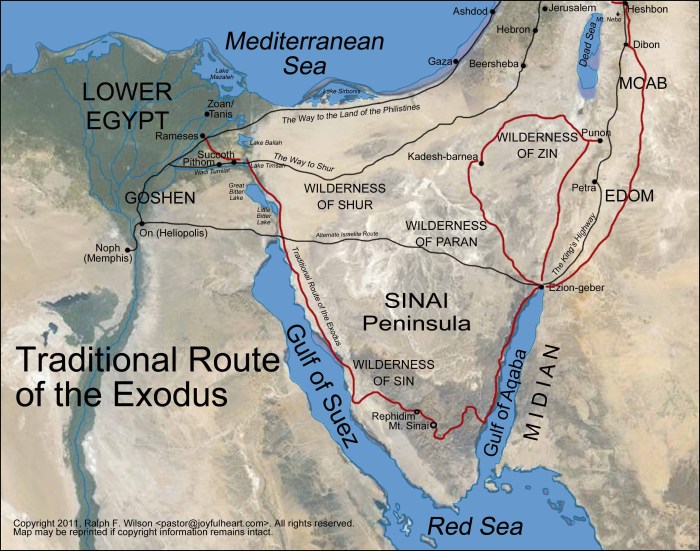Exodus highlights the exit from Egypt, an event of profound significance that shaped the destiny of the Israelites and left an enduring mark on human history. This captivating narrative, brimming with theological depth and historical intrigue, invites us to delve into a world of divine intervention, liberation, and the forging of a covenant between God and his chosen people.
The Exodus narrative stands as a cornerstone of Jewish identity, recounting the Israelites’ miraculous deliverance from centuries of slavery under the oppressive regime of the pharaohs. Through a series of extraordinary events, including the ten plagues and the parting of the Red Sea, God demonstrated his sovereignty and power, leading his people to freedom.
Exodus Narrative

The Exodus narrative, as recounted in the biblical book of Exodus, is a pivotal event in Jewish history. It narrates the liberation of the Israelites from slavery in Egypt and their subsequent journey towards the Promised Land.
The story revolves around key figures such as Moses, the prophet and leader who guides the Israelites out of Egypt; Aaron, Moses’ brother and his spokesman; and Pharaoh, the oppressive ruler of Egypt. The narrative is replete with miraculous events, including the Ten Plagues that God inflicts upon Egypt to compel Pharaoh to release the Israelites.
Significance of the Exodus
The Exodus holds immense significance in Jewish history and theology. It marks the birth of the Israelites as a nation and the establishment of their covenant with God. The event is commemorated annually through the Passover festival, a celebration of liberation and freedom.
Theological Themes
The Exodus narrative conveys profound theological themes, including:
- Divine Providence:The Exodus story demonstrates God’s intervention in human affairs and his commitment to liberate the oppressed.
- Covenant:The covenant established between God and the Israelites at Mount Sinai Artikels the terms of their relationship and God’s promise to guide and protect them.
- Redemption:The Exodus represents the redemption of the Israelites from slavery and their journey towards a new life in the Promised Land.
Historical Context: Exodus Highlights The Exit From Egypt

The Exodus narrative is deeply rooted in the historical context of the ancient Near East. The timing and location of the Exodus have been subjects of extensive debate among scholars, with various theories and evidence supporting different perspectives.
Evidence and Theories Regarding Timing and Location
Archaeological evidence, textual sources, and historical analysis have contributed to the development of several theories regarding the timing and location of the Exodus. One widely accepted theory suggests that the Exodus occurred during the reign of Pharaoh Ramesses II in the 13th century BCE.
This theory is supported by the presence of Egyptian records mentioning the enslavement of Israelites and the construction of storage cities in the eastern Nile Delta, where the biblical account places the Israelites’ bondage.
Other theories propose different time periods, such as the 15th century BCE during the reign of Pharaoh Thutmose III or the 12th century BCE under Pharaoh Merneptah. The location of the Exodus is also debated, with some scholars arguing for a northern route through Canaan and others favoring a southern route through the Sinai Peninsula.
Relationship to Other Ancient Near Eastern Texts, Exodus highlights the exit from egypt
The Exodus narrative exhibits parallels and connections with other ancient Near Eastern texts and traditions. Similarities have been noted in legal codes, creation stories, and flood narratives found in the literatures of Mesopotamia, Canaan, and Egypt. These parallels suggest a shared cultural and historical context in which the Exodus story developed.
The Exodus narrative, therefore, serves as a reflection of the complex historical and cultural landscape of the ancient Near East. Its timing, location, and relationship to other texts provide valuable insights into the origins and significance of this foundational event in biblical and Jewish history.
Archaeological Evidence

Archaeological evidence plays a significant role in assessing the historicity of the Exodus narrative. While some discoveries support certain aspects of the story, others challenge its literal interpretation.
However, interpreting archaeological evidence in the context of the Exodus faces challenges, including the passage of time, the scarcity of direct evidence, and the complexities of ancient societies.
Tel el-Amarna Letters
- The Tel el-Amarna letters, a collection of diplomatic correspondence discovered in Egypt, provide indirect evidence of unrest and conflict in Canaan during the late 14th century BCE.
- These letters mention a group of people known as the “Habiru,” who are sometimes identified with the Israelites described in the Exodus narrative.
- However, the letters do not explicitly mention the Exodus or the specific events described in the biblical account.
Merneptah Stele
- The Merneptah Stele, discovered in 1896, is a victory monument erected by Pharaoh Merneptah in the 13th century BCE.
- The stele contains an inscription that mentions “Israel” among a list of conquered peoples in Canaan.
- This discovery provides direct evidence for the existence of the Israelites in Canaan during the late Bronze Age.
Cultural and Literary Impact

The Exodus narrative has had a profound cultural and literary impact throughout history. It has been interpreted and reinterpreted in different cultural and religious contexts, inspiring countless works of art, literature, and music.
Artistic Depictions
The Exodus has been a popular subject for artistic depictions, from ancient Egyptian reliefs to Renaissance paintings. These works often portray the dramatic events of the Exodus, such as the parting of the Red Sea or the giving of the Ten Commandments.
Literary Adaptations
The Exodus has also been the subject of numerous literary adaptations, including plays, novels, and poems. These works often explore the themes of freedom, oppression, and the search for a promised land.
Musical Interpretations
The Exodus has also inspired many musical compositions, from oratorios to folk songs. These works often celebrate the triumph of good over evil and the hope for a better future.
Modern Perspectives

Modern perspectives on the Exodus narrative encompass a wide range of interpretations, reflecting the ongoing scholarly debate and research on the subject. Critical scholarship has played a significant role in shaping our understanding of the Exodus, leading to a reassessment of its historicity and a deeper exploration of its literary, cultural, and theological dimensions.
Role of Critical Scholarship
Critical scholarship has applied rigorous historical and literary analysis to the Exodus narrative, examining its textual composition, sources, and historical context. This approach has led to a recognition of the narrative’s complex and multi-layered nature, with elements of myth, legend, and historical memory intertwined.
Critical scholars have also highlighted the influence of ancient Near Eastern literature and cultural practices on the formation of the Exodus story.
Ongoing Debates and Controversies
Despite the advances made through critical scholarship, debates and controversies surrounding the Exodus narrative continue. These include:
- Historicity:The extent to which the Exodus narrative reflects actual historical events remains a subject of debate. While some scholars argue for a historical core, others maintain that the story is primarily a symbolic or mythical account.
- Location and Route:The exact location of the Exodus and the route taken by the Israelites during their journey to Canaan are still debated. Various theories have been proposed, each with its own evidence and limitations.
- Date:The dating of the Exodus is also a matter of scholarly discussion. Estimates range from the 13th to the 15th centuries BCE, with different lines of evidence supporting different chronologies.
Frequently Asked Questions
What is the central event of the Exodus narrative?
The central event is the liberation of the Israelites from slavery in Egypt, led by Moses.
What is the significance of the Exodus for the Israelites?
The Exodus is the foundational event in Jewish history, marking the birth of the nation and the establishment of a covenant with God.
What are the key theological themes conveyed in the Exodus story?
The story conveys themes of divine intervention, liberation, covenant, and the nature of God’s relationship with his people.
